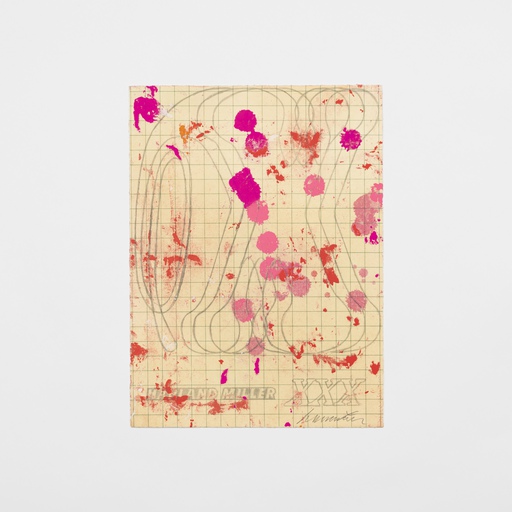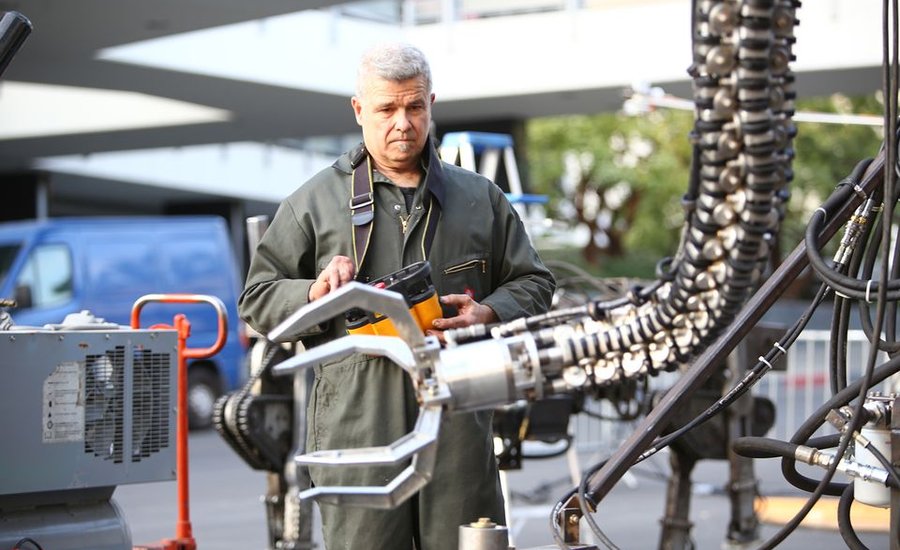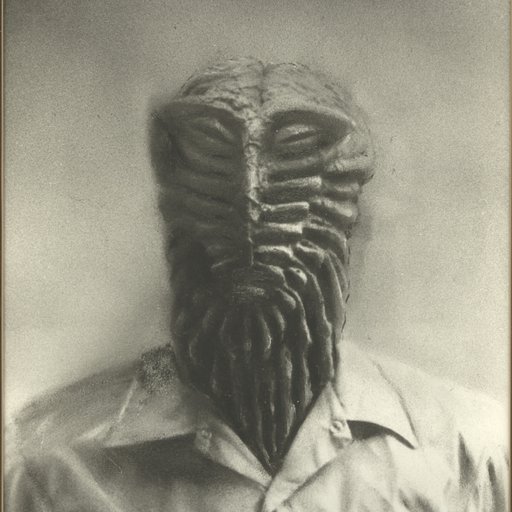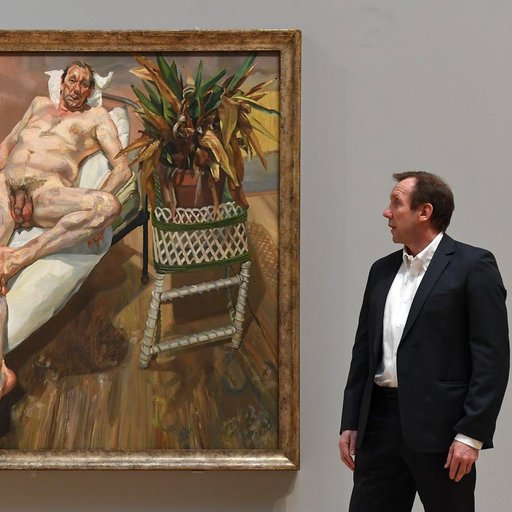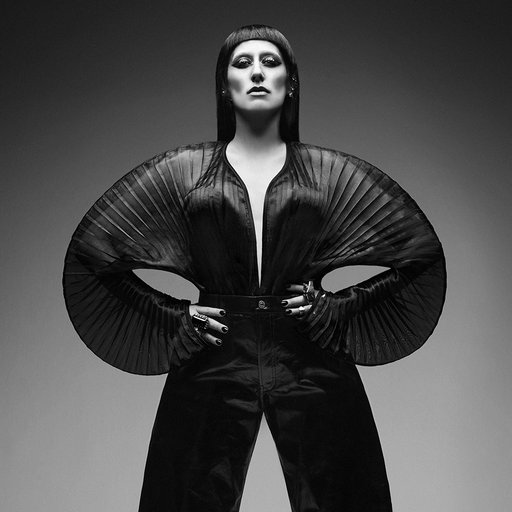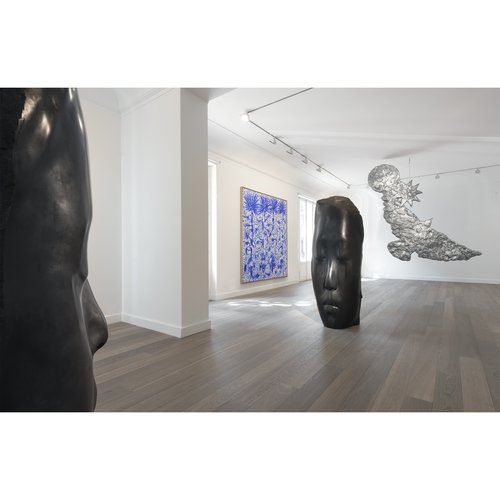Mark Pauline is an undisputed mastermind when it comes to sticking it to the man. For the past thirty years, he's been mesmerizing audiences and machinophiles around the world with his terrifying and satirical machine-based performances. Offering an alternative outlet for would-be war machines and their engineers, Pauline's Survival Research Laboratories (SRL) is a performance art group that re-appropriates these tools of weaponized industry into objects of pure entertainment. Their shows are a cacophonous melee of fast spinning parts, large projectiles, and explosions... did we mention the flame hurricane? They made a flame hurricane.
Rooted in Pauline's unbending impulse to resist authority whenever possible, SRL is relentlessly tongue-in-cheek. Their performances are often given elaborate bureaucratic titles, a satirical nod to those generated in academic research papers. The Unexpected Destruction of Elaborately Engineered Artifacts, Survival Research Laboratories Contemplates a Million Inconsiderate Experiments is a particularly procedural example.
This past January, after spending the past several decades as a self-made art-world outlaw, Pauline exhibited his first project within the institutional art world, showcasing his Pitching Machine (a gargantuan projectile that hurls wooden planks up to 200 miles per hour into a bulletproof container). The show received rave reviews and marked an exciting new territory for Pauline's work. Here, Artspace's Shannon Lee discusses the history of SRL and learns how to get away with stealing military-grade technology with Pauline at Culture Lab Detroit, where Pauline spoke on a panel with Anicka Yi and Eyal Weizman on the Aesthetics of the Future. Introduced by the actor Peter Weller (aka: Robocop), one couldn't find a more fitting place to be talking about machine re-appropriation than motor city itself.
How did SRL get started?
It's fairly straight forward. I wanted to learn some trades because I wanted to be an artist as a teenager. I didn't want to become an engineer in any typical sense because I knew that would mean I'd be a tool of the man. I made a conscious decision and decided to take sociology and psychology courses instead of advanced mathematics during my last years of high school. I also wanted to figure out how to make money as an artist; I'd known other people in the field and they just never had any money and had shitty jobs and I thought, "I'm not gonna do that." And so I learned a trade and was able to get a job.
What was your first job?
My first job was at an ironworks. Pretty soon I was making these massive crane booms and went on to build much bigger robots than I do now outside of Eglin Airforce base. I was building these massive thirty-ton target robots. I loved the tools! The more I got into it, the more I got to appreciate how powerful those machines were. At the time, mechanical technology was what was happening.
Still, when I was working at factories, I never really liked that I was making a bunch of stuff that nobody needs, or making trucks to bring the stuff that nobody needs to places nobody needs to go, or making stuff that's part of a killing economy. I was a foreman by the time I was nineteen, worked in the oil fields in Santa Barbara welding the high pressure pipes... they were difficult jobs. After all that, I went to art school for four years and when I graduated, everyone was encouraging me to move to New York to be a part of that whole art scene. It was mostly people from the punk circle like Exene from the band X and Arto Lindsay from DNA. But there were also people who'd wanted me to move to San Francisco—and that's where I ended up.
Sounds fairly happenstance.
It was! I was on my way to becoming a successful artist—the work I was doing in college was pretty well received (I’d gone to a small liberal arts school called Eckert College down in Florida). But I ended up in San Francisco doing marginally legal stuff. There was this show that I'd wanted to do where I'd take photos of these billboards that I would modify to say what they were really saying. The gallery I pitched this to was not having it. The owner asked if I was getting permission to modify them—of course not! They would also come with threats that said that they couldn't come to remove them for two weeks or we'd destroy all of their billboards. Really kind of proto-terrorist actions. But the idea for SRL came to me after two weeks of sitting down and brainstorming.
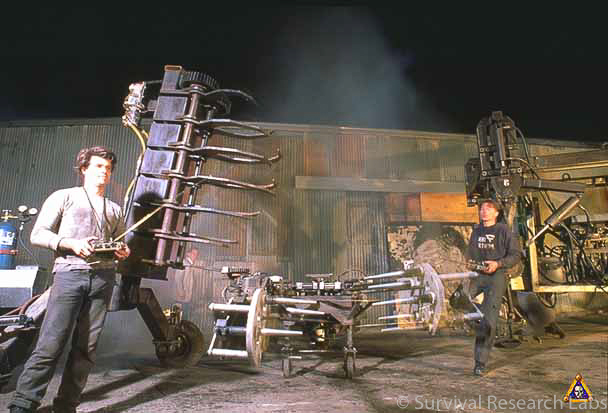 Mark Pauline and Matt Heckert operating the
Inchworm, Inspector,
and
Big Walker
at the old SRL yard.
Mark Pauline and Matt Heckert operating the
Inchworm, Inspector,
and
Big Walker
at the old SRL yard.
I'd been breaking into abandoned factories and saw all the resources that were there and thought, "You know what? I could use these!" And so SRL was born out of this idea that you could take these commercial or military technologies and re-engineer them so that they became completely impractical entertainment vehicles that would retain the power that made them useful in the first place, but without any of the baggage. That's when I came up with this system for our shows and formed it as a company. I actually stole the name from a right wing magazine.
No kidding!
There was an ad in Soldier of Fortune magazine for Survival Research Labs. It looked so fake! It looked like they'd cut and pasted a bunch of stuff to make this thing.
What was the original right wing SRL?
Sites for your M-16... that sort of thing. But I thought man, what a cool name! The next month, the editor of the magazine wrote an article about how they'd been defrauded by a bunch of fake advertisers and were clamping down. It was so fitting for me to steal from the right to make SRL. I got a licensed brand in San Francisco and a business license. I figured that I needed to be able to get away with a lot of stuff and the only way I could do that was by becoming a company—those are the entities that can really get away with anything. And it worked!
It grew to have an audience of thousands of people. Nobody had really seen anything like it; shows with machines. At that time in San Francisco, the punk scene was what was really happening and when I started telling my friends about SRL, they said, "that's insane! You're never going to be able to do that!" But then I did a couple and proved them all wrong. There's also no real art scene in San Francisco—the one that's there is super ossified and traditional. There were a lot of people out there that just wanted to do and see something different. I started assembling this really brilliant team with myself as the director. There were really brilliant tech people involved and we were able to build really complicated things—and for years, most of our materials were stolen! I could've gone to prison a thousand times over with all of my transgressions.
And they still haven't gotten you. Where do you get your materials now?
As the resources that became available without taking too much risk started to disappear, during the transition to a tech economy, I became aware of these companies that were handling all the assets for tech companies like Hewlett Packard. I actually broke into one of those buildings and thought, "Wow! Look at all this cool stuff!" And then it crossed my mind that instead of breaking the law, I could just try talking to them. It turns out that one of the people that ran this company knew me from the Exploratorium. I had done shows there and they all loved SRL. So I started getting equipment from there. Over the years, SRL became this go-to place for corporations to get rid of a whole company or laboratory full of high-tech stuff. They'd call me up and say things like, "none of the scientists here know what any of this stuff is and we need someone to figure out what's still worth saving" and so I'd just go in and buy all the things they were dumping. I'd get calls from military people, Google...
 Mark Pauline and the
Running Machine
(1992).
Mark Pauline and the
Running Machine
(1992).
In a weird way, you're a bit of a tech archivist.
It's more that I'm picking the pockets of billionaires. I get to pick all the valuable stuff, repair it, and resell it. That's how I can afford to do SRL. It became way too expensive in the '90s. Also being in San Francisco after the tech boom was impossible. You'd have to make an executive salary to live there and I didn't have a trust fund. All the artists I know that do bigger projects are either rich or have trust funds.
We’re in Detroit right now for Culture Lab and so much of the discussion here has been around afrocentricity and black representation. Given the context of our interview, I can’t help but wonder if you’ve given much thought to privilege and the fact that you were able to establish a bonafide career of sorts by way of illegal actions.
I've always been one to fight the power and to me, I always felt that it was a fundamental injustice that things like creative pursuits weren't considered as seriously as practical lifestyles. I didn't want to go into the fine art gallery world and have to kiss people's asses—that just felt like such a humiliating thing to do. So I decided to do things on my own and had to do what I had to do to make it happen. It was also much easier to get away with things back then. It was before security cameras were everywhere. Now you could never do something like that. It'd be virtually impossible. Back then, it was a pretty smart bet! Not only was there no infrastructure but the police in San Francisco had a really different view of what's important in terms of maintaining public order. They would catch me red-handed doing all this stuff and they'd just say, "Oh, you should probably get out of here. This is your stuff, right?"
Send you off with a warning.
I can't tell you how many times that happened. And when SRL got bigger in San Francisco, we'd be in the middle of doing something shady and they'd just go, "it's you guys! We love your show, do you have any posters?" We became a sort of weird, protected entity. People really appreciated us taking those risks.
I guess what I’m asking is whether you’ve considered how privilege might’ve factored into the early foundations of SRL. Like if you had been some brilliant kid creating, as you said, "proto-terrorist" works, but your skin happened to be brown, do you think you would’ve gotten away with as much?
I could've made any kind of career choice being a white guy. I decided at a very young age that I wasn't going to take advantage of those so-called opportunities because I didn't believe in that world and didn't want to be a part of it. I felt that to be responsible and to be able to live with myself, I needed to do something where I didn't take advantage of any of that stuff.
What I also saw was that a lot of people that didn't go that route didn't know how to do anything. They were basically ignorant in a way because they never really got involved enough in the processes that make money. They didn't understand how the power centers of the world ran. I really wanted to understand that language even though I didn't want to be part of that world.
I wanted to prove that you didn't have to be a pawn in these systems just to participate and that you could be an antipo while still accomplishing things. I wanted to create a space where men and women could work with really extreme things and professional tools and deep logistics but not have it be about any of that other crap. SRL is still that way. We take it as far as we can without hurting people. That's the bottom line.
 The Hovercraft
: "The loudest robot in the world at 150 decibels. Louder than a cruise missile until it blows up."
The Hovercraft
: "The loudest robot in the world at 150 decibels. Louder than a cruise missile until it blows up."
Has the transformation of San Francisco in the last twenty years affected your work at all?
Well, I was actually banned from there by the fire department in 1995. I was still able to do a few shows after that because the mayor Willie Brown really liked us. I think he just liked to fight the other parts of the government. So when we'd contact him for a show, we'd say, "we can't do this because the fire department won't let us," to which he'd respond, "fuck that!" He did it a few times when he was mayor. But the fire department got so pissed that he forced them to allow these shows and forced it down their throats—so once he was gone, they just said "no way."
I moved up to Petaluma which is about thirty miles north but I was able to hold on until 2009. I'd found a place up there that was thirty-six cents a foot. There's a lot of vacant commercial property out there because of the previous dot com boom. I was able to expand and advance our capabilities a lot out there.
San Francisco's panicking now because they're realizing that all the artists are gone and they know that the tech economy will go through a recession soon—as soon as this year probably. It'll deflate much slower than say the real estate bubble because there's still a lot of real stuff there but the excesses are just orders of magnitude more in the previous dot com era. It's unbelievable the things you see out there. Google Projects has hundreds of people working in giant warehouses spending hundreds of millions of dollars on projects that are pretty impractical. It's all on a knife-edge and they're going to have to cut all that stuff loose which means there will be a lot of jobs on the line.
I wanted to do a show in San Francisco in 2016. My wife had met a lot of people working in the city and it turns out there are a lot of SRL fans working fairly high up in the government. I was going to do these renegade pop-up shows over there and she just said, "Why don't you just go ask someone from the film or art commission out there?" and I was like, "Really? You think they'll go for this?" So I called them up and they let me rent a whole city block for $1,200 for a whole day. They had the police there for security and even the fire department. They just made us promise that we weren't going to kill anybody, that we weren't going to burn anything outside our performance area, and that we'd show them escape routes if people start to panic. It was like the old days! Back then, I never needed permits because the police would let us. In some ways, they're just desperate for things to happen in the city. They don't want it to just turn into drone city. People are just scared that when the clouds roll in, they won't be ready for it.
Has your work adapted or evolved over time to reflect different attitudes towards technology?
The main thing is that every success we have is a black mark on my record. Every time we do a really kick-ass show, people are like, "fuck, that's insane." People do love it and nobody's ever gotten hurt, but it does scare people. It scares people who we work with! And it's hard to work on your own.
I have to ask, given how close your work is thematically and the fact that you’re both rooted in San Francisco—do you have any ties to the burning man community?
No. They’re a little too peace-and-love, hippie-dippy for me.
All images courtesy of Survival Research Laboratories.
RELATED ARTICLES:
I Want to Believe: The Met Breuer Uncovers the Deep Links Between Art and Conspiracy




